

Tao Te Ching
Search Sages
Enter all or part of an sage's name or biography in the fields below, then press tab or enter to filter the list of Authors. Click the headings Name or Biography to sort by that column. Diacritics are ignored when searching.
Click on the author's name to go to their page.
| Author Name | Biography |
|---|---|
| Francis of Assisi |  Francis of Assisi Francis of AssisiOne of the most venerated religious figures in history and considered the patron saint of animals and the natural environment, a pope confirmed Francis as “Patron Saint of Ecology.” He believed nature itself is “the mirror of God” and he’s closely connected to the lineage of Lao Tzu, the early Taoists, Thoreau, Emerson, and Native Americans. He traveled widely, worked hard to end the Crusades, dedicated himself and his followers to poverty and helping the poor, exposed the materialism of the church leaders of his time, and by many accounts successfully changed history. |
| Franco | 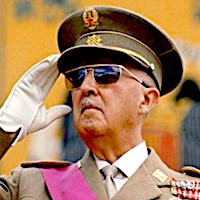 Franco FrancoFascist hero, war criminal, and tyrannical dictator Repressive Spanish general, tyrannical politician, and military dictator; Franco opposed democratic reforms, promoted Right-wing Groups, and helped start the disastrous Spanish civil war which killed over half a million people and--according to many historians--precipitated World War II. Supported by Nazi Germany and Fascist Italy, he outlawed all political parties except his own and became responsible for killing c. 400,000 dissenters in concentration and forced labor camps. Claiming neutrality, he supported Italy and Germany during World War II. When his policies plunged Spain into a severe depression, he reversed course, supported liberal policies and Spain became a part of NATO. Creating a government described as an example of fascism, he became a role model for dictators in south America including Pinochet and became responsible for hundreds of thousands of the deaths of his political opponents. Although still admired by fascist followers, the Spanish government removed all of his statues, street names, and memorials; banned all official references to him, took out his lyrics in the national anthem, and began creating monuments to his victims. |
| François Pétis de la Croix | 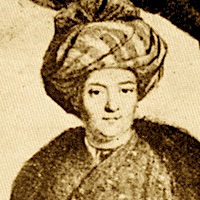 François Pétis de la Croix François Pétis de la CroixEarly and influential orientalist Translator, orientalist, interpreter, diplomat, and extensive traveler; Pétis de la Croix knew and spoke Arabic, Persian and Turkish. This led him into pioneering oriental studies of Sufism, the Masnavi Philosopher's stone, and the Muslim Qur'an. Much of his work however needed to be discrete and unpublished because his era was constrained by Catholic censorship, the witch craze, and extreme penalties for unorthodoxy. His influence did, however, inspire other works including Carlo Gozzi's The King Stag and Turandot. Benjamin Franklin popularized his publication of Genghis Khan's biography which became an influence on Thomas Jefferson and his Virginia Statute for Religious Freedom. |
| Franklin Roosevelt |  Franklin Roosevelt Franklin RooseveltChampion and creator of a more just and equitable society 32nd president of the United States, winner of a record 4 terms, widely considered one of the 3 greatest presidents and one of the of the 20th century's most influential politicians, and champion of the New Deal; Roosevelt met and successfully responded to some of the USA's most challenging problems including the Great Depression, Prohibition, and World War II. He helped establish the United Nations, Social Security, a minimum wage, and made child labor illegal. Like all of us though—in particular politicians—he has a shadow/dark side which manifested in the incarceration of Japanese-Americans during WWII, a subtle support for white supremacy, and a tremendous expansion of presidential powers. |
| Freda Bedi, Sister Palmo | 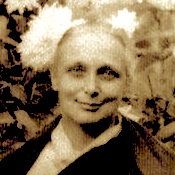 Freda Bedi, Sister Palmo Freda Bedi, Sister PalmoFreda Bedi, Sister Palmo (1911 – 1977) |
| Frederick Douglass | 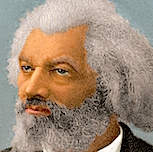 Frederick Douglass Frederick DouglassInternational symbol of social justice Escaped slave, most influential 19th century black leader, adviser to Abraham Lincoln, champion of the working class, author, orator, and newspaper editor; Douglass eloquently agitated for the abolition of slavery, racism and capital punishment; for women’s rights, free public education, and land reform. Calling racism a “diseased imagination,” he convinced Lincoln to let blacks fight in the Civil War and helped enlist troops. Internationally famous, author of an American classic autobiography, a father of liberation theology, and the first African American in many political positions; his memory symbolizes and inspires the spirit of people everywhere to resist oppression and work for social justice. |
| Friedrich Engels | 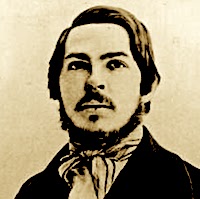 Friedrich Engels Friedrich EngelsBusinessman-philosopher, political theorist Co-author of The Communist Manifesto, polyglot speaking 9 languages, businessman, poet, journalist, philosopher; Engels grew up in a wealthy family that owned and operated large factories. He saw the horrible, slave-like working conditions, long hours, environmental degradations, and child labor from a very clear, first-hand perspective. He financially supported Karl Marx, edited his writings, and wrote influential books of his own. Together they organized workers, envisioned egalitarian societies, and developed communist theory. In spite of his dedicated, political activism, in order to finance Marx’s work, he reengages in many successful business ventures. Risking imprisonment, hiding from police, and participating in armed rebellions; his efforts to create a more equitable world went far beyond theory and speculation. Although claimed as inspirational founder of Stalin’s Soviet Union, his emphasis on individuality and the appreciation of literature, music and culture set his true philosophy in direct odds against Stalin. While most of the credit for Marxist theory went to Marx, Engels—behind the scenes editing, filling in gaps, and amplifying—may have had a more important influence. He lived with the fierce, Irish radical Mary Burns for over 20 years until her death; but, because they both considered state and church-controlled marriage a form of oppression, never married. |
| Friedrich Hayek | 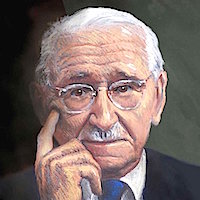 Friedrich Hayek Friedrich Hayek |
| Friedrich Hirth | 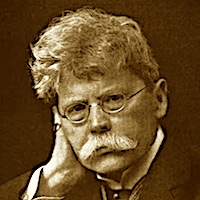 Friedrich Hirth Friedrich HirthAncient History of China |
| Friedrich Nietzsche | 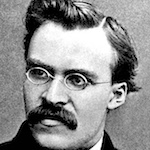 Friedrich Nietzsche Friedrich NietzschePhilosopher, scholar, poet, unifier of opposites and courageous critic of Western Civilization, Nietzsche proclaimed that “God is Dead,” that Christianity is “one great curse, one great intrinsic depravity,” and then started a “campaign against morality.” With a deep appreciation for Buddhism and rejecting external authorities like a “God” or a Church, he extolled the ability for people to discover their own morality grounded in reality rather than following herd-based ethics and beliefs. With a dedication to the sense over the words, people as diverse as D. H. Lawrence, Mishima, Rilke, Jack London, Hermann Hesse, Martin Heidegger, Carl Jung and many others described him as a most important influence on themselves personally as well on as society and the evolution of consciousness. |
| Friedrich Viktor Strauß | 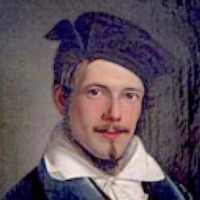 Friedrich Viktor Strauß Friedrich Viktor Strauß First German Tao Te Ching translator Theologian, poet, minister, translator, and scholar; Strauß published the first German Tao Te Ching translation in 1880. He also translated Chinese classic poetry, wrote novellas and gypsy romance. Sill popular today, his Tao Te Ching translation's 11th edition was published in 2004. His translation of the Shijing (Book of Songs) in 1880 became the first German translation. An ambassador and minister, he also translated his insight and understanding of Chinese wisdom into Western culture. Some of his hymns are still sung in churches and for weddings. |
| Fu Xi | 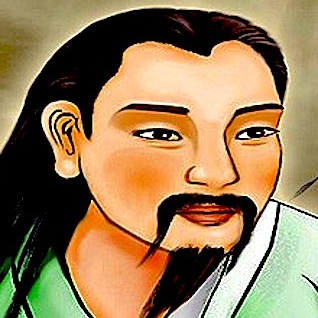 Fu Xi Fu XiEmperor/shaman progenitor of civilization symbol Considered the most important primogenitor of Chinese civilization, Fu Xi reigned after his sister/wife Nü Wa during the transition from matriarchal to patriarchal society when people first learned of the link between sex and children. Credited with inventing the I Ching hexagrams, hunting, fishing, cooking, the calendar, marriage, the original 100 Chinese surnames, and a system for writing characters; Fu Xi was an emperor/shaman who could tame wild animals as well as the wild, primitive humans of the time establishing the union of opposites and cosmic harmony. |
| Fyodor Mikhailovich Dostoyevsky | 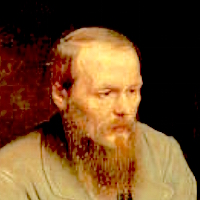 Fyodor Mikhailovich Dostoyevsky Fyodor Mikhailovich DostoyevskyOne of history’s most influential novelists and one of the greatest psychologists in world literature; Dostoyevsky led a tortured life that included being arrested for discussing banned books, being sentenced to death, spending 4 years in a Siberian prison camp, 6 years of forced/exiled military service, and struggling with a gambling addiction that made him have to beg for money. His second wife who he met when she was 19 and he 25 years older, helped turn his life around and produce some of the world’s best literature. His books have been translated into more than 170 languages and he was admired by Hermann Hesse, Ernest Hemingway, James Joyce, Kafka and Sartre. Albert Einstein called him a "great religious writer,” Nietzsche “among the most beautiful strokes of fortune in my life", Sigmund Freud called The Brothers Karamazov "the most magnificent novel ever written,“ and Virginia Woolf said, "Out of Shakespeare there is no more exciting reading.” His influence in modern time extends to the existentialists, surrealists, and the Beat generation. |
| G. I. Gurdjieff | 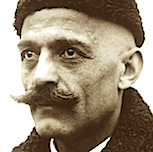 G. I. Gurdjieff G. I. GurdjieffPhilosopher, mystic, composer, ragged wanderer, successful entrepreneur, and deep spiritual teacher; Gurdjieff emphasized the hypnotic, dull, and asleep quality of our lives and - like the Buddha and many others - that we can “wake up.” His intense curiosity led him on extensive travels through Tibet, Russia, India, Iran, Egypt, North America and throughout Central Asia in a search for "seekers of truth,” people like we include on these lists. He felt that our religious and philosophical traditions have migrated from understanding the “sense” to mindless belief and adherence to the forms, to only the “words.” He sought to revitalize ancient wisdom traditions (Socratic, Stoic, Vedic, Buddhist) making them alive and relevant to contemporary life. His popular teachings on the enneagram remain influential today. |
| G. K. Chesterton | 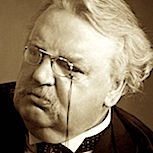 G. K. Chesterton G. K. ChestertonSocial critic, theologian, and philosopher turning popular proverbs inside out with deep insight and laugh-out-loud humor; Chesterton was called both the best writer and best thinker of the 20th century, “the most unjustly neglected writer of our time,” and the "prince of paradox.” One of the most prolific authors of all time, he wrote more than 100 books, hundreds of poems, plays, short stories and over 4000 newspaper articles. Over 300 pounds and 6’4,” normally wandering around lost with a cigar in his mouth, writing many of his articles in train stations after inadvertently missing his train; he criticized both capitalism and socialism predicting the modern polemic stalemate of progressives “continually making mistakes” while conservatives continue to “prevent the mistakes from being corrected." He influenced atheist C.S. Lewis’s conversion to Christianity, the movement for Irish Independence, and Gandhi’s movement to end British colonial rule. He “changed the life” of Marshall McLuhan and inspired the novels and writings of Neil Gaiman, Terry Pratchett, Ernest Hemingway, Graham Greene, Agatha Christie, Jorge Luis Borges, George Bernard Shaw, H.G. Wells, E.F. Schumacher, Bertrand Russell and many more. |
| Gabriel García Márquez | 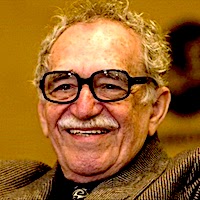 Gabriel García Márquez Gabriel García MárquezThe greatest Colombian “The greatest Colombian who ever lived,” journalist, newspaper editor, 1st Colombian and 4th Latin American Nobel Prize winner, and the best and most popular Spanish writer since Cervantes; Gabriel García Márquez quickly became a respected and influential critic of Latin American politics. He popularized the writing style now called magical realism that has now pervaded modern literature and film, perhaps reaching a peak in the writings of Haruki Murakami. Fellow Nobel Prize winner, William Kennedy called his book, One Hundred Years of Solitude "the first piece of literature since the Book of Genesis that should be required reading for the entire human race" but he was labeled a “subversive” and denied US visas until Bill Clinton called this book his favorite novel and lifted the travel ban. An active, anti-imperialist socialist, his muck-racking journalism led to an exile in Europe and relocation in Mexico but his fame opened political doors and he became an important influence on Cuban president Fidel Castro, other Latin American leaders, and on negotiations between the Colombian government and guerrilla groups. |
| Galileo | 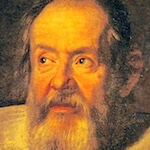 Galileo GalileoArrested by the Inquisition for the last 9 years of his life but called by Einstein “the father of modern science;” books banned by the Catholic Church but called by Stephen Hawking responsible for the birth of modern science; condemned and persecuted by conservative contemporaries but called by Grotius “the greatest mind of all time;” Galileo – though living in a time when “heretics” were burned at the stake – raised the status of science, with his telescope designs demonstrated the universe’s immensity, and helped science separate from both philosophy and religion. |
| Gampopa | 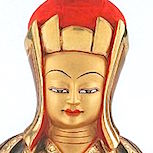 Gampopa GampopaDoctor, student of Milereapa, and founder of the Kagyu school of Tibetan Buddhism; Gampopa started as a householder with a family and then became a monk when they died. In a similar way, he changed the yogi/householder style of Marpa and Milarepa into a monastic approach. He integrated Atisha’s Kadam school with the Mahamudra teachings of Milerapa and four of his disciples founded the four main Kagyu schools. Though on the surface, this moved the tradition away from the non-thought, wisdom-beyond-words approach and instead emphasized rules and concepts; stories tell of Taoist teachers and influences on Gampopa, secret practices and teachings he gave in this lineage as well. |
| Gaspara Stampa |  Gaspara Stampa Gaspara StampaUnrecognized during her life with only 4 of her more than 300 sonnets and poems published, Gaspara is now considered one of the best 16th century lyricists and greatest Italian woman poet of any time. From a merchant class and not nobility like the other poets of her time, she didn’t let her humble origin and lack of credentials stop her from writing some of the most memorable works of her era. Also a wonderful singer and lute player, she transformed the pain of unrequited love into inspired artistic creation that became a milestone in women's literature and a huge inspiration for Rainer Maria Rilke and many others. |
| Gendün Chöphel | 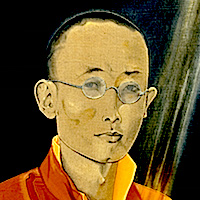 Gendün Chöphel Gendün ChöphelChild prodigy, iconoclast, artist, master debater, greatest Tibetan poet of the 20th century, Buddhist monk from an early age, modern Tibet’s first historian, and one of the most influential modern Tibetan intellectuals; Gendun Chopel kept a non-sectarian view throughout his life and challenged cultural, religious, and political dogmas. He lived with Nicholas and Helena Roerich for 2 years helping their son translate the Blue Annals which became a 1275 page book. He abandoned his monastic vows, drank alcohol, practiced and wrote the first Tibetan guide to love and sex. Having traveled and studied widely, he realized the importance of abandoning blind superstition and integrating Tibetan culture into the modern world. Instead of heading his warnings and developing Tibet in this way however, the conservative, status quo establishment had him whipped and imprisoned, ignored his message until the Chinese army arrived in Lhasa. |